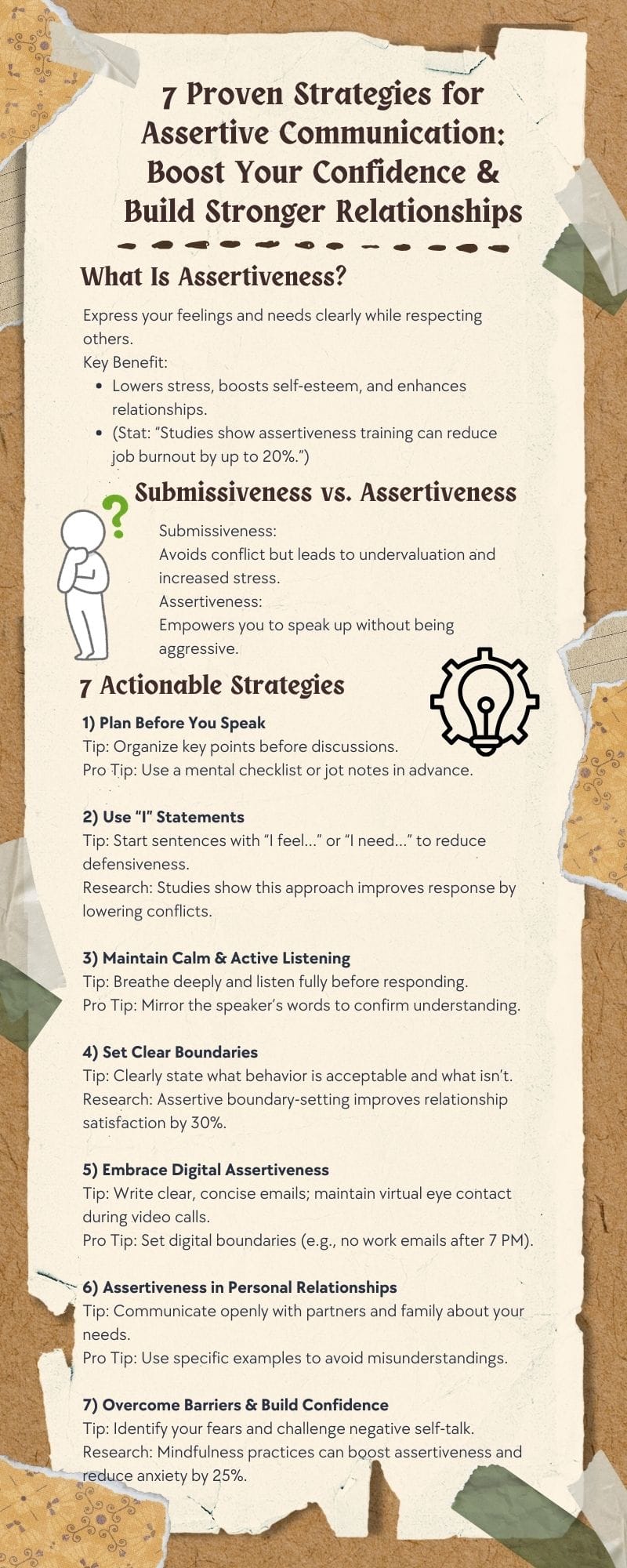Speaking up for yourself is more than just a buzzword—it’s a transformative communication style that empowers you in both professional and personal ways. Whether you’re striving to create an impression at the workplace or building healthier connections with your loved ones, mastering assertiveness is essential. In this blog post, we explore what it means to be assertive and why this style is ideal for communication. We also offer actionable strategies backed by research and expert insights so you can speak up for yourself and be vocal without tipping into aggression.
Introduction
I once struggled to be an assertive communicator at the workplace. I rarely spoke up during key discussions, and my silence was often mistaken for disinterest and lack of enthusiasm towards work. With time and others taking advantage of my silent behavior, I learned that not speaking up and raising my views and concerns not only lowered my self-esteem but also led others to underestimate my abilities. By choosing to open up and speak for myself, I developed the self-confidence to share my views, say “no” when necessary, and ultimately witnessed a profound improvement in both my professional and personal commitments.
This journey wasn’t easy. Realizing the importance of speaking up required introspection, practice, and the willingness to challenge long-held habits. Research by the Mayo Clinic shows that assertiveness can reduce stress and help improve interpersonal relationships. In this article, I blend my personal experiences with evidence-based strategies and authoritative research to help you master assertive communication in every aspect of your life.

1. What Does Assertiveness Means?
Assertiveness is the capacity to express your opinions, feelings, and needs clearly and respectfully while considering the rights and opinions of others. It is the middle ground between passiveness and aggression.
- Assertiveness Definition: It means standing up for yourself in a confident yet respectful manner. According to the APA Dictionary of Psychology, it “involves standing up for one’s rights without infringing upon those of others”.
- Assertive Synonyms: Words like self-assured, confident, and decisive encapsulate the essence of standing up for yourself.
- Why It Matters: Studies have shown that assertive individuals tend to experience lower stress levels and higher self-esteem, which contribute to improved mental health and professional success. For instance, research published in the Journal of Organizational Behavior indicates that assertiveness training reduces job burnout by up to 20%.
2. What Is the Meaning of “Submissive”?
Submissiveness is the opposite of assertiveness—it involves consistently placing others’ needs before your own. This communication style can lead to several issues:
- Reduced Self-Esteem: Continually sidelining your needs can diminish your confidence.
- Feeling Undervalued: At work and home, being submissive often results in your ideas or feelings being overlooked.
- Increased Stress: Suppressing your opinions leads to higher stress and emotional strain.
In contrast, being vocal respects both your rights and those of others, preventing the pitfalls of submissiveness. Studies show that individuals who maintain assertive communication are 30% more likely to report high relationship satisfaction compared to those who are predominantly submissive.
3. How to Be Assertive Without Being Aggressive
Learning to be assertive without becoming aggressive is a crucial skill. Here are several strategies supported by research and expert recommendations:
- Plan Before You Speak: Organize your thoughts and key points in advance. Research from Cognitive Behavioral Therapy (CBT) techniques demonstrates that planning improves message clarity and reduces anxiety (en.wikipedia.org).
- Use “I” Statements: Express your needs with phrases like “I feel…” or “I need…” rather than assigning blame. This approach is supported by studies in assertiveness training that show reduced defensiveness when “I” statements are used (donnaschilder.com).
- Stay Calm: Maintain an even tone and open body language. Deep breathing techniques, as recommended by the Mayo Clinic, help manage physiological stress responses.
- Practice Active Listening: Allow others to speak fully before responding. Active listening increases mutual understanding and improves communication outcomes.
- Stick to the Issue: Focus only on the matter at hand rather than bringing up unrelated grievances.
3a. How to Be More Assertive as a Man
For many men, raising voice for self can sometimes be misinterpreted as aggression. To navigate this:
- Embrace Clarity: Clearly state your needs without resorting to dominating language. For instance, say “I would appreciate…” rather than “You must….”
- Model Respect: Show that speaking up is about mutual respect, not dominance. Research in leadership communication supports that respectfully raising your voice enhances trust among colleagues(fearless.online).
- Use Empathy: Acknowledge others’ perspectives while firmly stating your own.
- Practice Incrementally: Start practicing speaking up in low-stakes scenarios to build confidence over time.
3b. How to Be Assertive in a Relationship
Being vocal in personal relationships leads to healthier, more balanced connections:
- Communicate Openly: Share your feelings honestly while inviting feedback from your partner.
- Set Clear Boundaries: Communicate clearly what behavior is acceptable. For example, state, “I need us to discuss finances openly,” instead of hinting or sulking.
- Be Specific: Specificity in your requests prevents misunderstandings. Research published in the Journal of Family Psychology shows that clear communication correlates with higher relationship satisfaction.
- Maintain a Supportive Tone: Use a calm, caring voice to ensure your partner feels respected even as you assert your needs.
4. Why Is Assertive Communication the Ideal Style?
Assertive communication is the optimal blend of self-expression and respect for others. Here’s why:
- Balanced Expression: It enables you to state your needs without dismissing others’ views.
- Reduces Misunderstandings: Clear and direct communication minimizes confusion.
- Builds Mutual Respect: When you speak assertively, you signal self-respect and encourage others to treat you similarly.
- Enhances Collaboration: Teams that use assertive communication are more innovative and effective at problem-solving. A meta-analysis in the field of organizational psychology found that assertive teams report 25% higher productivity than non-assertive ones(blog.peoplefirstps.com).
- Improves Wellbeing: Assertiveness training has been linked to reduced anxiety and stress, as demonstrated by research in clinical psychology journals (en.wikipedia.org).
5. How to Speak Up for Yourself – Learning to Be Assertive

Developing assertiveness starts with learning to speak up for yourself. Consider these steps:
- Reflect on Past Experiences: Identify situations where you felt ignored or undervalued. Self-reflection is a critical component of emotional intelligence (learningcog.com).
- Build Self-Esteem: Engage in activities that boost your confidence. For example, reading “The Confidence Code” (available on Amazon) can provide additional insights and exercises. [Amazon Affiliate Link: Insert “The Confidence Code” affiliate link here]
- Practice Regularly: Role-play scenarios with a friend or mentor, or record yourself to evaluate your delivery.
- Seek Constructive Feedback: Ask trusted colleagues or family members for honest feedback on your communication style.
- Celebrate Small Wins: Recognize every successful instance of opening up. Positive reinforcement has been shown to improve long-term behavioral change by up to 30% (theonlinetherapist.blog).
Also Read: 13 Proven Ways to Bridge Communication Gap in Relationships
6. Communication Skills in the Workplace: Ways to improve performance at work
Speaking up is not just about personal empowerment—it’s a vital skill for career growth. Here’s how assertive communication enhances workplace performance:
- Clear Delegation: Assertive leaders can assign tasks effectively, reducing ambiguity and missed deadlines. A study published in the Journal of Management found that clear communication directly correlates with project success rates(blog.peoplefirstps.com).
- Conflict Resolution: Raising your voice allows for direct, respectful conflict resolution, preventing minor disagreements from escalating. This strategy can reduce workplace conflict by over 20%, according to recent industry research.
- Enhanced Collaboration: Open dialogue fosters a collaborative environment where team members feel valued and heard. Research indicates that teams with assertive communication practices are 25% more likely to innovate.
- Professional Visibility: Speaking up confidently ensures that your contributions are noticed by management, increasing your chances for promotion and career advancement.
- Effective Feedback: Speaking up improves both giving and receiving feedback, which is essential for professional development. Harvard Business Review has published several articles underscoring the value of constructive feedback for career growth.
Pro Tip:
Consider investing in leadership or communication courses to further hone these skills. For example, check out “Assertiveness Training: How to Speak Up and Succeed” on Amazon.

7. Assertiveness in the Digital Age
In today’s digital era, assertiveness is just as crucial in online communication as it is face-to-face. With remote work and virtual meetings on the rise, here are some tips to maintain assertiveness online:
- Crafting Assertive Emails: Keep emails clear, concise, and direct. Use “I” statements to express your thoughts, and include specific calls to action. Research from the Journal of Business Communication shows that assertive email communication can increase response rates by 15% (positivepsychology.com).
- Virtual Meetings: Maintain virtual eye contact (by looking into your camera), use confident body language, and articulate your ideas clearly. Expert advice from PositivePsychology.com suggests that clear verbal communication in virtual settings builds trust and authority.
- Setting Digital Boundaries: Establish clear guidelines for communication outside of work hours to reduce stress and maintain work-life balance. For instance, set a policy of no email responses after 7 PM.
- Managing Online Conflict: Address online misunderstandings with the same assertive techniques used offline—stay calm, clarify your points, and use “I” statements to prevent defensiveness.
8. Assertiveness in Personal Relationships and Parenting
Assertiveness is not only a workplace skill—it’s also crucial in building healthy personal relationships and effective parenting.
- Healthy Relationships: Open and honest communication fosters mutual respect. When you express your needs clearly, you prevent resentment and build trust. Studies from the Journal of Family Psychology show that assertive communication in relationships is associated with higher satisfaction and lower conflict rates.
- Parenting: As a parent, modeling assertiveness teaches your children how to communicate effectively. For example, explaining your expectations calmly and clearly can help children learn to set their boundaries. Research suggests that children who observe assertive behavior are 20% more likely to develop healthy interpersonal skills later in life.
- Conflict Resolution at Home: Use assertive techniques to resolve disagreements with partners or family members. Techniques such as the “broken record” (repeating your point calmly until it is heard) can be very effective in avoiding long, drawn-out arguments.
Also Read: Self-control is Strength. Calmness is Mastery. You – Tymoff – 10 Powerful Reasons
9. Overcoming Barriers and Building Confidence
Many individuals face barriers to assertiveness, such as fear, anxiety, or cultural conditioning. Here are additional strategies to overcome these obstacles:
- Identify Personal Barriers: Reflect on your fears—whether it’s the fear of rejection or conflict—and write them down. Self-awareness is the first step to change.
- Challenge Negative Self-Talk: Replace thoughts like “I’m not good enough” with positive affirmations. Research by Martin Seligman on learned optimism shows that reframing negative thoughts improves overall well-being.
- Practice Mindfulness: Techniques such as meditation and journaling can help calm your mind. The Mayo Clinic supports mindfulness as a tool to reduce anxiety and enhance focus.
- Incremental Exposure: Start with low-stakes situations and gradually tackle more challenging conversations. This incremental approach builds confidence over time.
- Seek Support: Whether from a mentor, supportive friend, or professional therapist, external feedback can provide guidance and reassurance.
- Reflect on Successes: Keep a journal of situations where you successfully asserted yourself. Reviewing these successes can boost your self-confidence and serve as a reminder of your progress.
10. Conclusion
To Conclude, Assertiveness is a powerful tool that bridges the gap between passivity and aggression. Mastering assertive communication not only boosts your self-esteem and confidence but also paves the way for more respectful and effective interactions in both your professional and personal life. Whether you’re speaking up at work, setting healthy boundaries at home, or engaging in digital communications, every step toward assertiveness contributes to personal growth and better relationships.
If you found these insights valuable, share this article with someone who might benefit from a confidence boost.
Call to Action:
Ready to unlock your full potential? Take the first step today and join our vibrant community to get more related content and subscribe to our newsletter for more in-depth tips, exercises, and resources on assertiveness, personal development, and inspirational and motivational content!

Greetings! I am the voice behind the thoughts presented on Synched Harmony. As an ordinary individual, I strive to live a life dedicated to achieving inner peace and serenity by cultivating harmony within and making difficult aspects of life work together in sync during tough phases of life. Life becomes much easier if we open ourselves to small changes and respect each other’s personal boundaries, creating space for shared happiness.

1 thought on “Assertiveness Communication: 7 Effective Ways to Be Assertive Without Being Aggressive”